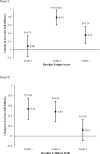Correlates of Exercise Self-efficacy in a Randomized Trial of Mind-Body Exercise in Patients With Chronic Heart Failure
- PMID: 26959498
- PMCID: PMC4846539
- DOI: 10.1097/HCR.0000000000000170
Correlates of Exercise Self-efficacy in a Randomized Trial of Mind-Body Exercise in Patients With Chronic Heart Failure
Abstract
Purpose: Exercise self-efficacy is one of the strongest predictors of physical activity behavior. Prior literature suggests that tai chi, a mind-body exercise, may increase self-efficacy; however, this is not extensively studied. Little is known about the factors associated with development of exercise self-efficacy in a population with heart failure.
Methods: We utilized data from a randomized controlled trial of 12 weeks of group tai chi classes versus education in patients with chronic heart failure (n = 100). Multivariable linear regression was used to explore possible correlates of change in exercise self-efficacy in the entire sample and in the subgroup who received tai chi (n = 50). Covariates included baseline quality of life, social support, functional parameters, physical activity, serum biomarkers, sociodemographics, and clinical heart failure parameters.
Results: Baseline 6-minute walk (β=-0.0003, SE = 0.0001, P = .02) and fatigue score (β= 0.03, SE = 0.01, P = .004) were significantly associated with change in self-efficacy, with those in the lowest tertile for 6-minute walk and higher tertiles for fatigue score experiencing the greatest change. Intervention group assignment was highly significant, with self-efficacy significantly improved in the tai chi group compared to the education control over 12 weeks (β= 0.39, SE = 0.11, P < .001). In the tai chi group alone, lower baseline oxygen uptake (β=-0.05, SE = 0.01, P = .001), decreased mood (β=-0.01, SE = 0.003, P = .004), and higher catecholamine level (epinephrine β= 0.003, SE = 0.001, P = .005) were significantly associated with improvements in self-efficacy.
Conclusions: In this exploratory analysis, our initial findings support the concept that interventions like tai chi may be beneficial in improving exercise self-efficacy, especially in patients with heart failure who are deconditioned, with lower functional status and mood.
Conflict of interest statement
Figures
References
-
- Davies P, Taylor F, Beswick A, et al. Promoting patient uptake and adherence in cardiac rehabilitation. Cochrane Database Syst Rev. 2014;6:CD007131. - PubMed
-
- Barbour KA, Miller NH. Adherence to exercise training in heart failure: a review. Heart Fail Rev. 2008;13:81–9. - PubMed
-
- Du H, Everett B, Newton PJ, Salamonson Y, Davidson PM. Self-efficacy: a useful construct to promote physical activity in people with stable chronic heart failure. J Clin Nurs. 2012;21:301–10. - PubMed
-
- Maeda U, Shen BJ, Schwarz ER, Farrell KA, Mallon S. Self-efficacy mediates the associations of social support and depression with treatment adherence in heart failure patients. Int J Behav Med. 2013;20:88–96. - PubMed
Publication types
MeSH terms
Substances
Grants and funding
LinkOut - more resources
Full Text Sources
Other Literature Sources
Medical


